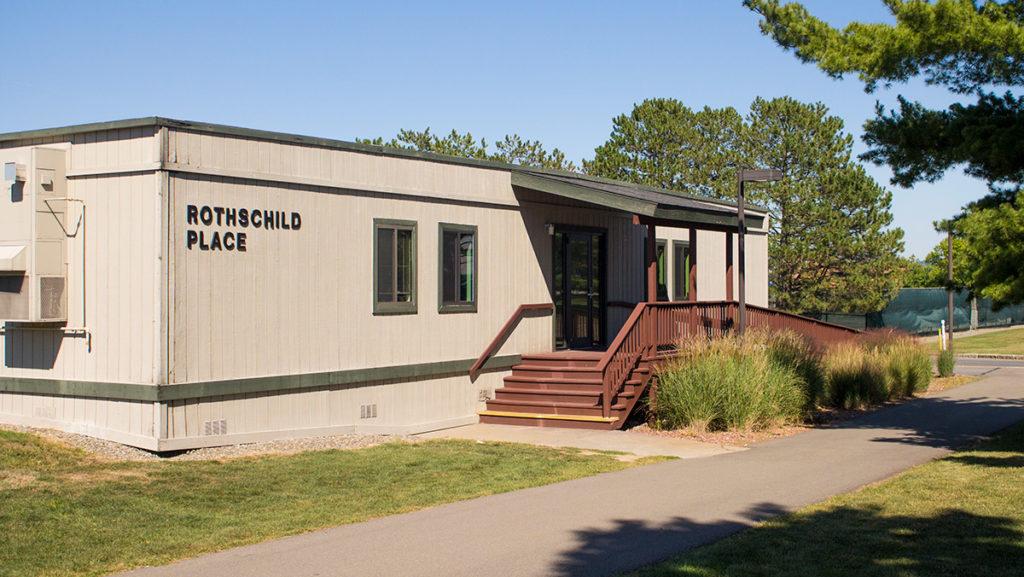Rothschild Place, a temporary structure on Ithaca College’s campus built in 2004 to house department overflow, has been operating under a temporary occupancy permit since its creation. However, the college applied for and was granted a permanent occupancy permit for the building Aug. 2. Despite this change, there are no plans at this time to renovate or build a permanent structure.
Rothschild Place is a modular-style building — similar to a mobile home — located next to Roy H. Park Hall that houses departments such as Student Accessibility Services, the Academic Advising Center and offices for faculty. Since being brought onto campus, Rothschild Place has housed several other departments, including Information Technology Services and the Office of Human Resources.
Tim Carey, associate vice president for facilities, said Rothschild Place was given an extension from the Town of Ithaca Planning Board for its temporary occupancy permit in 2009. This permit classified Rothschild as temporary and allowed the structure to be occupied until September 2018. With the deadline approaching, Carey said the college decided to apply for a permanent occupancy permit in August to give the college time to figure out the future of the building.
“We were looking at that expiration date coming, so we opted to ask the town for a permanent–occupancy permit so we could have the right to occupy the building safely,” Carey said. “But that by no means should infer that the building is a permanent building.”
Despite the filing of the permit, Carey said the college still plans to move the departments in Rothschild Place to permanent structures. However, he said there is no timeline or plan yet for where departments currently in Rothschild will eventually end up. The Campus Master Plan, a document that outlines physical changes possible in the campus’s future, which was approved in May 2015, does not include Rothschild on the map.
Some faculty in Rothschild expressed concern about their extended stay in the structure.
Craig Duncan, associate professor in and chair of the Department of Philosophy and Religion, moved with his department out of Park Hall and into Rothschild Place in May 2013. Duncan said this is the third building he has been in with the philosophy and religion department.
“I would shudder to think we were here for the long haul,” Duncan said.
Another worry for some is the mobile-home appearance of Rothschild Place.
“We were concerned that it would send the message to students that we are not a valued department,” Duncan said. “I believe we are a valued department, but our housing doesn’t reflect that fact.”
Senior Mackenzie Gannon, an office assistant in Rothschild Place, said she thinks a uniform, structural look to all the buildings on campus is important.
“It’s an important building, and to make the building look more … cohesive with the architectural structure of the rest of the buildings on campus would be kind of cool,” Gannon said.
Senior Tal Aizen, a student assistant for SAS, said he often jokes with people about the appearance of the building.
“We keep telling people, ‘Look for the trailer-looking building next to Park,’ and they say, ‘Oh, is that still there?’ Like, it’s going to stay here,” Aizen said.
At the Aug. 2 Town of Ithaca Planning Board meeting, during which the permanent occupancy permit was issued, Fred Wilcox, chair of the town planning board and retired associate professor of writing, asked Carey about this point, according to the meeting notes.
Wilcox said the college has a beautiful campus and asked why it would want “such an unattractive building,” according to the notes. Carey responded by saying there is a diversity of building appearances on campus, which makes Rothschild “not as unfriendly to the eyes as one might think,” according to the notes.
Despite cosmetic concerns with the building, Christine Thompson, lecturer in the Department of Communication Studies, said a positive side to being in close quarters with different departments is it can create a sense of collaboration across disciplines.
“You are seeing people who work in different areas more frequently than you would be if you were in an office just with people you were in the same field as,” Thompson said.
Carey said temporary structures like these are not uncommon in higher education. He said this is his third campus in a row where he has seen structures in the same situation as Rothschild.
“It is not uncommon for that temporary building to become a little bit more temporary than folks have anticipated,” Carey said.








